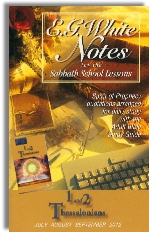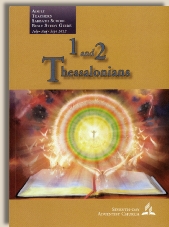|
||||||||||||||
Commentary on "Thessalonica in Paul's Day"
Day 1: Sabbath Afternoon, July 14, 2012 - Introduction
Overview
This week is going to be a different kind of study from the usual commentary on biblical texts. Right from the beginning, Jon Paulien informs us that the focus will be on the historical and cultural context of ancient Thessalonica in order to understand better Paul's letter to the church from that city. While the context has the potential to illuminate the message of Paul, it can also mislead the reader if the historical context is given prominence over the content of the biblical text. It is true that God used the language and other cultural elements pertaining to the ancient cultures of the biblical writers to carry His message across, condescending at the human level, but it is equally true that the content delivered through these human means was divine, God's thoughts being far above human thoughts. While the medium of transmission is human, what is transmitted is divine.
Observations
"For my thoughts are not your thoughts, neither are your ways my ways, declares the LORD. For as the heavens are higher than the earth, so are my ways higher than your ways and my thoughts than your thoughts." (Isaiah 55:8-9 ESV)
Apostle Paul went as far as affirming that a natural person could not even understand the divine message apart from the special intervention of the Holy Spirit. Spiritual things are spiritually discerned.
"And we impart this in words not taught by human wisdom but taught by the Spirit, interpreting spiritual truths to those who are spiritual. The natural person does not accept the things of the Spirit of God, for they are folly to him, and he is not able to understand them because they are spiritually discerned." (1 Corinthians 2:13-14 ESV)
It is strange to read Jon Paulien comments that historical and cultural context is something that "helps us to understand how Paul’s original hearers and readers would have understood him. In so doing, it clarifies the meaning of what he wrote and the impact it had back then on both church and society." If he said merely that the form of the message, or the outward aspect of the message impacted the way the original hearers would have understood Paul, this would put things in the right perspective. But the historical and cultural context is not helpful in explaining the way in which the original hearers and readers would have understood Paul’s internal meaning.
The historical and cultural context reflects human natural wisdom which does not understand God's message; In fact, it rejects God’s wisdom as folly, because historical and cultural context is simply natural, fallen human wisdom. Consequently it is erroneous to let the cultural and historical context define or exercise control over the interpretation of the text.
Ultimately the Holy Spirit who is the Author of the Bible has to have the final word in interpreting what he inspired the biblical authors to write.
Paulien rightly affirms that "the more we know about the ideas and beliefs of the Thessalonians, the better we can understand that against which Paul was reacting." However, even this viewpoint can be troubling if it receives an importance that it should not have. First and foremost the gospel and God's message is the way to fight spiritual battles that are universal in nature. This fact makes the epistles of the New Testament, written for a Greek world 2000 years ago, still relevant. While the cultural ideas and beliefs of the Thessalonians may have been unique, Paul was reacting against spiritual ideas and beliefs that are still alive today because flesh, the world, and Satan are still part of human experience.
Paulien errs in attributing too much uniqueness and specificity to Paul's epistle by labeling his message to the Thessalonians as "unique". According to Paul's own confession, he had a message that he preached everywhere he went, Christ and Him crucified—the gospel (1 Corinthians 2:2). While he certainly kept an eye on the culture and background of the hearers adapting his method of delivery to their peculiar settings (see his message to the hearers in Athens, Acts 17), he had preached Christ and Him crucified consistently. His message was the same message he preached to the Jews in Judea, and when those in Thessalonica received the gospel, they entered into the same experiences of suffering that the Jewish Christians were experiencing. The unconverted gentile/Greek neighbors treated the church in Thessalonica the same way the unconverted Jewish neighbors treated the Church in Judea
"And we also thank God constantly for this, that when you received the word of God, which you heard from us, you accepted it not as the word of men but as what it really is, the word of God, which is at work in you believers. For you, brothers, became imitators of the churches of God in Christ Jesus that are in Judea. For you suffered the same things from your own countrymen as they did from the Jews, who killed both the Lord Jesus and the prophets, and drove us out, and displease God and oppose all mankind by hindering us from speaking to the Gentiles that they might be saved—so as always to fill up the measure of their sins." (1 Thessalonians 2:13-16 ESV)
It should be clear that despite different contexts, the message of Paul to the Thessalonians was not "unique", because there is only one gospel, only one Savior, and only one sacrifice for sin that made only one finished, complete atonement that "has perfected for all time those who are being sanctified." (Hebrews 10:14 ESV). In this light we should look at the unique historical context and setting of Thessalonica in order not to be carried astray and derailed by human wisdom opposed to God's spiritual message which can be only spiritually understood, discerned and accepted.
Copyright 2012 BibleStudiesForAdventists.com. All rights reserved. Revised July 12, 2012. This website is published by Life Assurance Ministries, Camp Verde, Arizona, USA, the publisher of Proclamation! Magazine. Contact email: BibleStudiesForAdventists@gmail.com.
The Sabbath School Bible Study Guide and the corresponding E.G. White Notes are published by Pacific Press Publishing Association, which is owned and operated by the Seventh-day Adventist church. The current quarter's editions are pictured above.
Official Adventist Resources
Standard Edition Study Guide Week 3
Teacher's Edition Study Guide Week 3
Easy Reading Edition Study Guide Wk 3
Search the Complete Published Ellen G. White Writings
Please Support This Project


